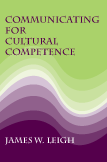“I love the communication focus!! It’s perfect for social workers, as that’s an essential component of cultural competence.” — Juliet Rothman, University of California, Berkeley
“Finally, a book that relates to the issue of multiculturalism and the helping relationship. I was encouraged by the up-to-date materials and the quality of the research!” — Marina Bademan, Metro State College
”The book is a valuable asset to social workers in an increasingly diverse society. I like the exercises provided. They encourage the student to develop cultural competence in a way that helps to empower the client, and not at the expense of the client.” — Alfred Joseph, Miami University
“Well researched, with lots of great resources (appendices). The book has a good balance of theory and skills-based activities.” — H. Jardine, Macon State College
“This book adds much needed insight into understanding how to become culturally competent. The author does an excellent job of conceptualizing the knowledge, values, and skills social workers need to engage in competent social work practice.” — Freddie Avant, Stephen F. Austin State University
“The author does an excellent job of connecting theory to skill development. The ethnographic and naturalist approach creates an ‘other-focused’ practice, which is essential for social work practice.” — Rebecca E. Coleman, Grace College

188 pages, $38.95 list
1-57766-210-5
978-1-57766-210-5
© 1998
paperback
Communicating for Cultural Competence
Today, more than ever, workers in the helping professions face a culturally diverse society in which they will engage marginalized individuals. Students and practitioners of social work need to understand how these people experience the world. To that end, Leigh first provides background on becoming a culturally competent social worker and then focuses on the beginning stage of the helping process—interviewing. This much-needed text features a highly regarded ethnographic interview model that casts clients in the role of experts on their own lives. Readers learn how to gather information that fosters a positive relationship between helper and client, eventually leading to a culturally congruent assessment and treatment plan. In addition, end of chapter exercises; excerpts of interviews; and detailed information on assessment, negotiated consensus treatment planning, and culturally relevant interventions enhance readers’ learning experience.
Reactions
1. Introduction
2. Becoming Culturally Competent
3. Naturalistic Inquiry: A Base for Cultural Competence
4. Knowledge: The Foundation for Cultural Competence
5. The Helping Relationship
6. Friendly Conversation
7. Setting the Stage for the Ethnographic Interview
8. Global Questions
9. Cover Terms
10. Descriptors
11. Terminating the Interview
12. The Ethnographic Interview Summary
Appendix A: Falling Out of the Model: Evaluating Self
Appendix B: Self-Evaluation Form
Appendix C: Assessment, Negotiated Consensus Treatment Planning, and Culturally Relevant Interventions and Treatment
Appendix D: Code of Ethics, National Association of Social Workers
Appendix E: Code of Ethics, National Federation of Societies for Clinical Social Work
Appendix F: Code of Ethics, National Association of Black Social Workers
Appendix G: Seven Principles for the Culturally Competent Social Worker
2. Becoming Culturally Competent
3. Naturalistic Inquiry: A Base for Cultural Competence
4. Knowledge: The Foundation for Cultural Competence
5. The Helping Relationship
6. Friendly Conversation
7. Setting the Stage for the Ethnographic Interview
8. Global Questions
9. Cover Terms
10. Descriptors
11. Terminating the Interview
12. The Ethnographic Interview Summary
Appendix A: Falling Out of the Model: Evaluating Self
Appendix B: Self-Evaluation Form
Appendix C: Assessment, Negotiated Consensus Treatment Planning, and Culturally Relevant Interventions and Treatment
Appendix D: Code of Ethics, National Association of Social Workers
Appendix E: Code of Ethics, National Federation of Societies for Clinical Social Work
Appendix F: Code of Ethics, National Association of Black Social Workers
Appendix G: Seven Principles for the Culturally Competent Social Worker